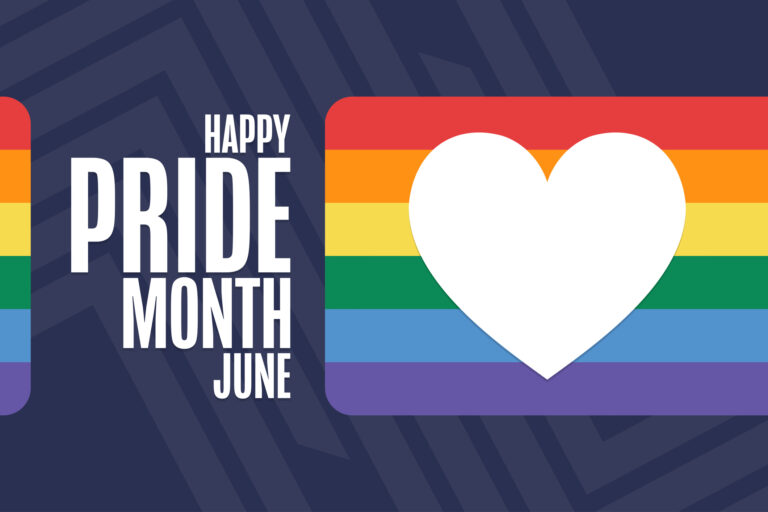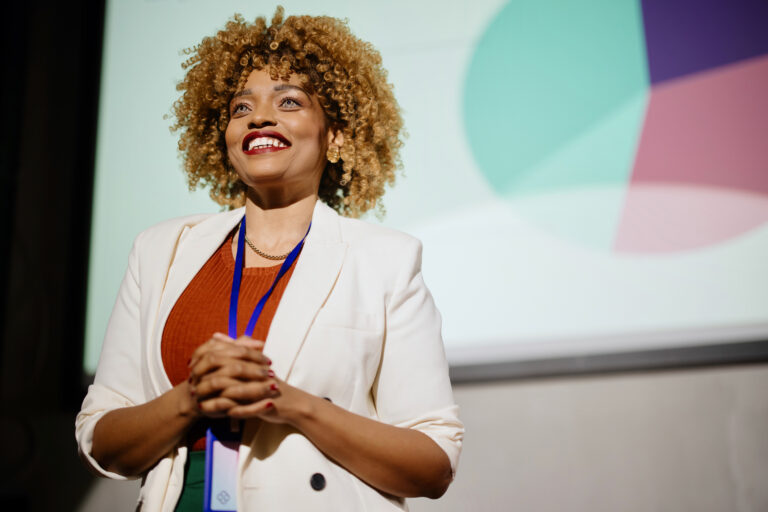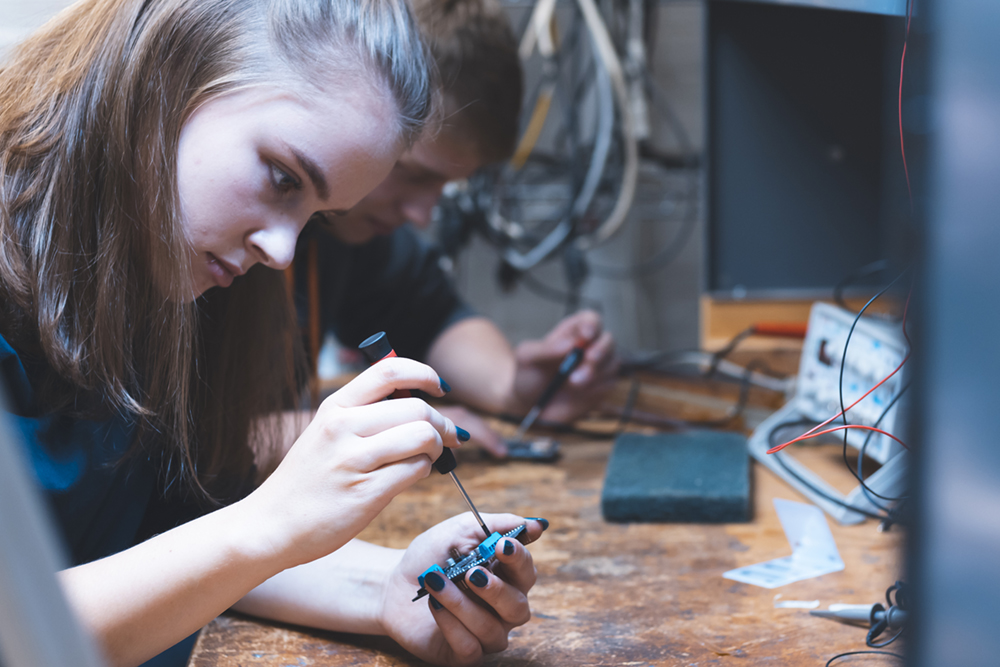Be Bold, But Not Too Bold
By Katrina Johnson León, Ed.D.
One summer, after playing all day with Dal, my favorite male cousin, Dad picked me up and started asking the general questions. I shared that we had decided on our future careers. I would be a nurse and Dal would be the doctor. I will never forget my Dad’s change in expression as he glanced over the top of his glasses, in my direction, as we drove down the road, and his question, “Why aren’t you going to be the doctor?”
I was raised by a man who fought for custody in the mid-1970s. He was breaking societal norms back then by fighting for his right to parent. His question shook me. Why had I been so quick to accept the assigned gendered role? My 8-year-old self was processing that Dad was encouraging me to be a doctor, which was empowering, but the only women I knew in the workforce were my teachers at school. All around me were messages in music, on television, from family and friends that there were gendered roles. I had adhered to the messaging I heard and witnessed, while Dad shared that girls could be doctors, too.
Turning on the television, we watched the Brady Bunch, The Huxtables, The A-Team and then Gilligan’s Island with Maryann and Ginger. Can we just mention soap operas and telenovelas? All of the female roles in each series were traditional or flaunting the power of the female body to gain favor or meet a need. Dad may have told me at 8 years old that I should be a doctor, but by high school I was encouraged to cheer rather than play volleyball, and when we shopped for clothes, he pointed out skirts to wear. As a high school junior, I remember half-smiling to myself because his messaging seemed inconsistent. Be a doctor, cheer, wear skirts, and be the smartest person in the room. Was Dad’s messaging incongruous or was he telling me I had the option to do it all?
Being feminine and demonstrating your power seemed counterintuitive, and to a certain extent, still does in today’s world. Be bold, but not too bold. Be smart, but don’t be a showoff. Don’t forget, you have to have a perfect shape and be well coiffed. I think of Reese Witherspoon in “Legally Blonde” and how she balanced her bold pink femininity with brains, much to the laughter and chagrin of men and avowedly studious female classmates. Elle Woods, Ms. Witherspoon’s character, displayed the spunk and intelligence to win a court case based on her knowledge of proper hair care. In one sense it sounds asinine, but breaking down the storyline, it is as simple as what my Dad was trying to establish. I could be a doctor, cheer, wear skirts, and be smart despite societal expectations trying to label me with a broad stroke of a brush.
Family and societal expectations play a large role shaping who we are and what we do as adults. The voices and suggestions from family loop over and over again when making decisions. When I was in college and figuratively surfing through possible majors, I received gender specific feedback from various family members. Business major? “Sweetie, shouldn’t you choose something more feminine?” Imagine the surprise when I decided I was going to apply for law school. My grandma, “Trina, is that really what you want?” In grandma’s mind, being a lawyer would not allow me to grow a family or have a spouse and that was the obvious expectation. I think the only one who was initially disappointed when I selected education was my Dad, as by that point, he was pushing for me to be an airline pilot.
A statement made by my sister one day when I was fully immersed in career, marriage, and child-rearing forced me to once again consider the pressures from society. I was teaching, managing a household, and fully immersed in my mom role. All important roles. My sister was a teacher, managing a household, and a mom, but doing it all without a spouse. Rushing between work and home responsibilities, my sister said, “you are a single mom too, only you are a married single mom.” That stopped me in my tracks. She was right! I had a spouse, but that force of nature, known as societal expectations, encouraged me to do it all, be it all. All the doctor’s visits, trips to practices and games, grocery shopping, paying bills, organizing birthdays, celebrations… it was all on me. My spouse had never said he expected me to do all of those things. There was never even a conversation. I took it upon myself. I was just handling business. As individuals, we need to monitor our willingness to take on responsibilities that should be shared.
As educators, we see gender-based social expectations play out on school sites and district offices. Being a professional in the educational industry has been an interesting lesson in balance. As a teacher, there was a proportionate number of male and female staff members, at least at the high school level. I often found myself pushing back against male counterparts who believed I should be the one completing the paperwork for an event or club. I was also tasked with organizing field trips or making the calls for guest speakers. It wasn’t that my colleague was incapable, it was just that those societal expectations and gendered roles were ever present. Once I realized what was going on, the balance of duties shifted.
When I moved into administration, the number of female colleagues dropped significantly. At the high school administrative level, it felt very much like a club and although I had incredible supervisors, they were often unaware, or accepting, of the gendered roles various individuals assumed. I remember a new male colleague walking into my office one day and he decided to tell me what I would purchase for the administrative assistants celebration. Mind you, it was not a discussion. He told me I would need to pick up flowers and donuts. When I asked what he was picking up, he said he would give me the money to cover it. Stunned, and in awe of his lack of awareness, I said no. He then said, he would pick up the donuts and I could pick up the flowers. At that point, I was looking at him with an expression that indicated I was not in agreement. I said no again. He looked at me, eyebrows raised, head tilted, and said, “You don’t have a problem saying no, do you?” No. Sometimes we just have to say it.
Recently I was on an interview panel for a high school principal. There were several female-presenting candidates and one male candidate. The female-presenting candidates had significant administrative experience, whereas the male candidate had limited experience. After all of the candidates were interviewed and we were discussing the results, a panel member made the statement, “high school principals should be male.” This individual made this comment either not remembering or not caring that, at one point, I had been a high school principal. A stunned silence settled in the conference room. It was necessary to address the bias and I did, then we moved forward to select the next principal. How many times do we have interview panel members who have those same thoughts, but choose not to share them?
Feeling like I am an empowered, capable human, I do not feel particularly inclined to engage in re-education conversations each time the opportunity presents itself. However, there are times when the gravity of a statement creates a visceral reaction and in those situations, a response is required. Sometimes that response is not verbal. When I was told, “I knew you are a smart girl” I instantly knew it was time to make a choice. We have to pick and choose what we will accept, respond to, or know when to leave.
How do we balance the unrealistic expectations placed on us by outside forces? We discuss our experiences with the young, or not so young colleagues around us. We share our missteps, early assumptions about our personal and professional roles, then model to those around us what is reasonable and acceptable. We continue to point out societal expectations that are not only ridiculous, but unhealthy. I have benefitted from incredible professional role models who have not only held me accountable, but who have demonstrated how and when to say enough. Let’s consistently role model expectations to our students and colleagues. We are powerful, capable, and talented humans. We have every ability to inspire change. Now is the time.
Katrina Johnson León, Ed.D., is superintendent of San Pasqual Valley Unified School District.






























Wow! I could hear your voice all the way through that article. It is so true, being bold, but not too bold is the balance. You are a role model for all of us who are teetering that line. Thank you for all you are doing at SP! It’s amazing being on this journey with you!